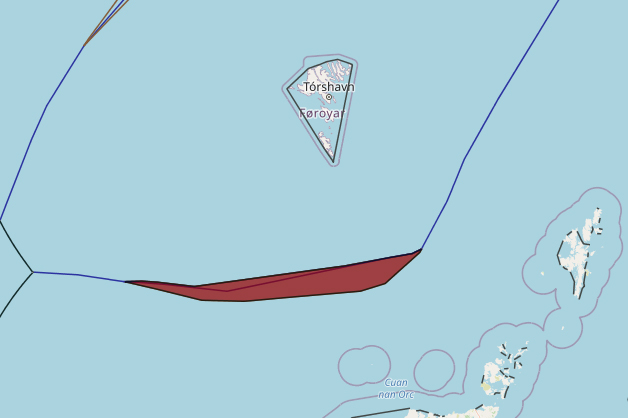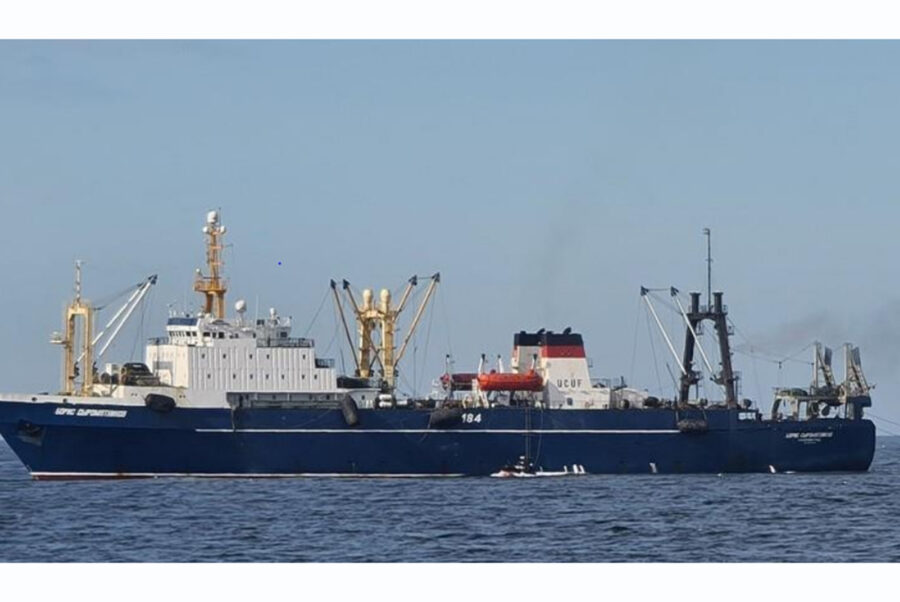Pelagic fishermen have reacted with anger to the continuing presence of a fleet of Russian midwater freezer trawlers fishing for blue whiting in the UK’s ‘shared area’ with the Faroe Islands, reports Andy Read.
Agreed in 1999 between the Faroe and UK governments, the arrangement was intended primarily to allow oil and gas exploration, but also contains explicit agreement on fisheries.
The relationship between the Faroes and Russia is particularly strong. The UK and EU pelagic industries were outraged when Faroe unilaterally increased its blue whiting quota from 82,000t to 267,413t. Unable to catch this fish itself, which largely exists as paper quota, Faroe then ‘swapped’ the fish for cod quota in the Russian EEZ.
The unilateral moves to increase pelagic quotas led to the loss of MSC accreditation for blue whiting and mackerel for the UK fleet. Although a scientific committee was set up as a result of discussions between states in late 2021, in an attempt to agree TAC shares, the situation remains deadlocked.
Faroese cold-store specialist Bergfrost, operating in the port of Fuglafjørður, reported last year that Russian transhipment of pelagic fish in Faroe exceeded 300,000t, to reefers shipping to Russia, for domestic consumption, as well as to West Africa. The Russian pelagic freezer vessels currently fishing within the UK/Faroe shared area have likewise been using Faroese ports to tranship their blue whiting, which is destined for human consumption markets in West Africa.

The shared UK/Faroe zone midway between the north of Scotland and the Faroe Islands.
A Defra spokesperson told Fishing News: “The Faroe Islands must take a tougher stance on this. Allowing Russian vessels access to an area worth around £16m in the midst of the horrors we are seeing in Ukraine is simply wrong.
“We, alongside our allies and partners, have taken urgent action to maximise damage to Putin’s war machine and degrade the Russian economy for years to come. We will categorically not license any Russian-flagged vessels to fish anywhere in UK waters, and we will continue to urge the Faroes to follow our lead, ban these vessels, and do what is ultimately the right thing to do.”
Faroe, which was for many years ruled from Denmark, retains a special relationship with the country. However, Danish politicians have long criticised Faroe for building such a close relationship with Russia, in particular agreeing a host of new deals with Russia after the EU put in place sanctions against Russia following the 2014 invasion of Crimea.
These agreements saw Faroe replace the EU as the main source of pelagic fish to markets in Russia, as well as provide for Russian use of Faroese ports, and access to demersal stocks for Faroese vessels inside the Russian EEZ.
Michael Aastrup Jensen, the foreign affairs spokesman for the main party in Denmark’s ruling coalition, shared his frustration in 2018, just after a new deal between Faroe and Russia was signed, saying: “My personal opinion has been clear for a long time. I find it very problematic that the Faroe Islands enter into this new deal with Russia and a number of Russia’s close allies.
“They go against all other countries and territories in the EU community, who are trying to isolate Russia and stop the kind of power- politics that [Russian] president [Vladimir] Putin applies towards Crimea, Georgia and other states.”
Ian Gatt, CEO of the Scottish Pelagic Fishermen’s Association, told Fishing News that the association had pre-warned both the UK and Scottish governments that it was likely that Faroe would grant licences to the Russian fleet to fish blue whiting in the ‘special area’, and this has indeed happened.
He said: “As far as Faroe Islands is concerned, it’s business as usual with Russia. The Russian fleet is being fully serviced by Faroe Islands, including refuelling and the ability to tranship catches to reefers. The proceeds of this fishery will further fuel the war effort by the Kremlin.

Later in the week, the fleet of Russian vessels were joined by a similar number of Icelandic boats, seen in this screenshot of the VMS used to monitor the shared area. Russian vessels are shown in black and white, and Icelandic vessels in blue. The shared UK/ Faroe area is coloured green.
“This is a deplorable action by Faroe Islands to continue this relationship with Russia while we watch the atrocities in Ukraine. Thousands of Ukrainian people fleeing for their lives, homes bombed to rubble, and the enormous death tally of innocent civilians is clearly not registering on the Faroe Islands’ radar.
“The association recognises that both UK and Scottish governments have been working through diplomatic routes to try and dissuade Faroe Islands from licensing Russian vessels to fish in what is mostly UK waters – but this has failed.
“It’s imperative that the UK now revisits its fishery relationship with Faroe Islands.”
Shadow fisheries spokesperson Daniel Zeichner MP echoed these sentiments, telling Fishing News: “The disclosure that the government is aware of Russian trawlers using a legal loophole to fish off the Scottish coast is quite sickening.
“It needs to be made absolutely clear to the Faroe government that this is not acceptable, and that they must not use ambiguities in the treaties to allow Russian trawlers to carry on uninterrupted.” Unbelievably, the Russian fleet was joined later last week by a fleet of Icelandic pelagic trawlers, also licensed by Faroe to fish in the joint UK/Faroe area.
As Fishing News went to press, six vessels were visible on the VMS inside the 300km2 area, as blue whiting continued to arrive there from grounds further south and west, where they were unavailable to either fleet.
This story was taken from the latest issue of Fishing News. For more up-to-date and in-depth reports on the UK and Irish commercial fishing sector, subscribe to Fishing News here or buy the latest single issue for just £3.30 here.
(Main image: The Russian freezer trawler Boris Siromyatnikov, one of a fleet of vessels licensed by Faroe to fish in the shared UK/Faroe fishing zone. Photo: Marine Traffic)








